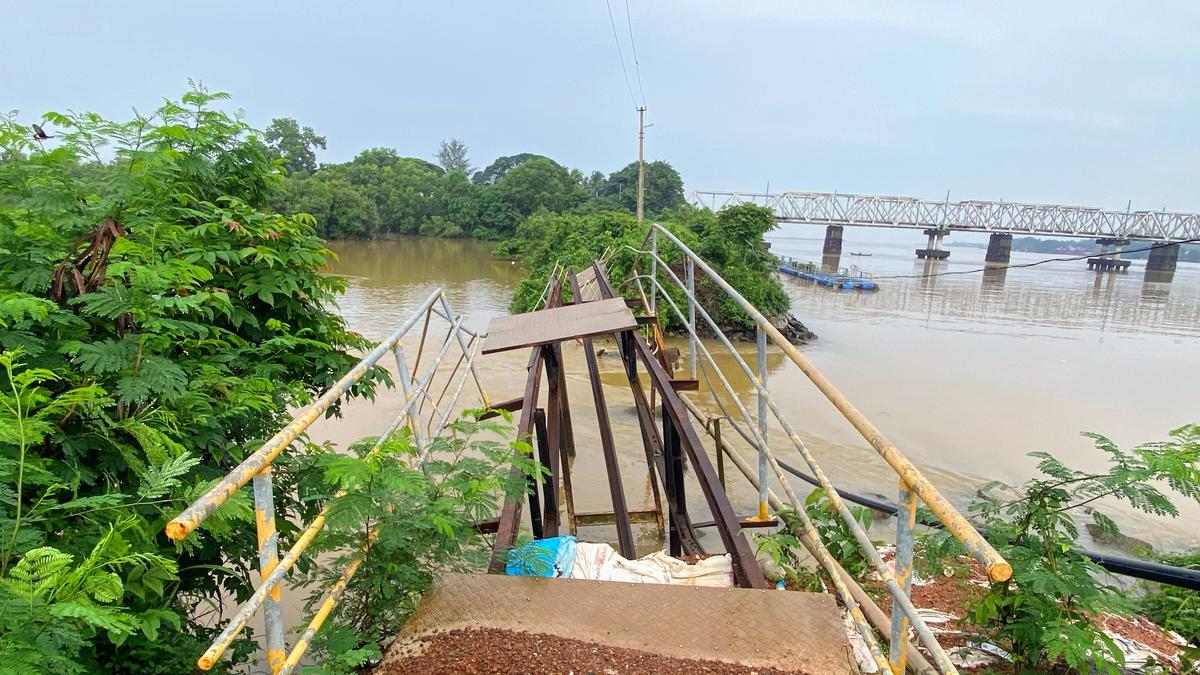
Snapped footbridge lengthens the journey of Ullal Hoige residents
The Hindu
Residents of Ullal Hoige forced to take detour after footbridge collapse; erstwhile BJP govt sanctioned ₹2.5 crore for construction of concrete bridge; local residents approached regional CZMA; CZMA decided to allow contractor to repair damaged footbridge & connecting path; hope govt takes it up soon.
Hundreds of residents of Ullal Hoige and surrounding areas on the southern bank of Netravathi have been forced to take a detour via Thokkottu to get a bus to the city after a footbridge across the backwaters of Netravathi collapsed here recently.
The footbridge linked the short-cut walking route for residents, who crossed the Mangaluru Central-Shoranur Railway line and the Netravathi backwaters to reach National Highway 66 near the Netravathi bridge. They used to board or alight from buses to and from the city.
Made of iron scaffolding and iron sheets, the footbridge had become weak over the years due to the strong water currents during high and low tides of the Arabian Sea. Residents said they had almost abandoned using the short-cut for the last four months as it had become weak and a fortnight ago, it collapsed.
The erstwhile BJP government had sanctioned ₹2.5 crore to the Public Works Department for the construction of a 7.5 m wide concrete bridge and a connecting road for the residents.
While the contractor was dumping soil on a portion of the backwaters abutting NH 66 for road formation, some local residents approached the regional coastal zone management authority complaining the area falls under the CRZ limits. Authority officials found that the location was covered with mangroves and the project in the proposed shape could be undertaken.
Mangaluru South MLA D. Vedavyasa Kamath alleged that the ruling party supporters were behind stalling the work. “This work was among the several in his constituency for which the government has now stopped funding.”
Upon PWD’s recent application to CZMA for clearing the project, the officials said it would damage the mangroves with the road formation.

“Writing, in general, is a very solitary process,” says Yauvanika Chopra, Associate Director at The New India Foundation (NIF), which, earlier this year, announced the 12th edition of its NIF Book Fellowships for research and scholarship about Indian history after Independence. While authors, in general, are built for it, it can still get very lonely, says Chopra, pointing out that the fellowship’s community support is as valuable as the monetary benefits it offers. “There is a solid community of NIF fellows, trustees, language experts, jury members, all of whom are incredibly competent,” she says. “They really help make authors feel supported from manuscript to publication, so you never feel like you’re struggling through isolation.”

Several principals of government and private schools in Delhi on Tuesday said the Directorate of Education (DoE) circular from a day earlier, directing schools to conduct classes in ‘hybrid’ mode, had caused confusion regarding day-to-day operations as they did not know how many students would return to school from Wednesday and how would teachers instruct in two modes — online and in person — at once. The DoE circular on Monday had also stated that the option to “exercise online mode of education, wherever available, shall vest with the students and their guardians”. Several schoolteachers also expressed confusion regarding the DoE order. A government schoolteacher said he was unsure of how to cope with the resumption of physical classes, given that the order directing government offices to ensure that 50% of the employees work from home is still in place. On Monday, the Commission for Air Quality Management in the National Capital Region and Adjoining Areas (CAQM) had, on the orders of the Supreme Court, directed schools in Delhi-NCR to shift classes to the hybrid mode, following which the DoE had issued the circular. The court had urged the Centre’s pollution watchdog to consider restarting physical classes due to many students missing out on the mid-day meals and lacking the necessary means to attend classes online. The CAQM had, on November 20, asked schools in Delhi-NCR to shift to the online mode of teaching.









